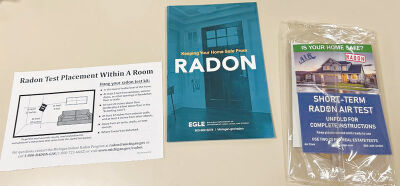
Radon test kits, including this one by Air Check Inc., are available at local health departments across the state for at-home radon testing.
Image provided by the Michigan Department of Environment, Great Lakes and Energy and the Macomb County Health Department
METRO DETROIT — Throughout January, residents are encouraged to test their homes for a serious health hazard that can’t be seen or smelled.
Long-term exposure to radon — a cancer-causing, naturally occurring radioactive gas found in soil and rock that enters homes through cracks in the foundation floor or walls, sump pits, drains or other openings — increases the risk of developing lung cancer, which accounts for more deaths than any other form of cancer in the U.S., according to the Michigan Department of Environment, Great Lakes and Energy.
Although radon harmlessly disperses in outdoor air at low levels, when trapped in buildings and homes, it can be hazardous, especially at high concentrations.
“January is radon action month here in Michigan,” said Leslie E. Smith III, an indoor radon specialist for EGLE. “It is odorless, colorless and tasteless. It is always present. The issue with radon is, being a radioactive gas, it comes from the breakdown of uranium in the soil, and that breakdown of gas can actually move into our homes from the soil below and into our living spaces. This radioactive gas can build up to levels that are unhealthy for our air quality and can damage our lung tissue over years of prolonged exposure.”
Behind smoking, Smith said, radon is the second-leading cause of lung cancer and is considered a leading environmental cause of cancer deaths in the United States.
The U.S. Environmental Protection Agency estimates that radon is responsible for about 30,000 lung cancer deaths in the United States each year.
Elevated radon levels have been found in buildings in all 83 Michigan counties, according to Smith, who said testing is even more important now that many Michiganders are working from home.
“We want to take away that conversation that ‘radon doesn’t exist where I live.’ Radon is an issue in all areas of the state, and the only way to know what the radon levels are in any one individual home is to test the home, so all homes should be tested,” he explained.
In Michigan, one in every four Michigan homes is projected to have radon levels exceeding the federal action level of 4 picocuries per liter of air, or 4 pCi/L. According to the EGLE, approximately 30% of homes tested in Oakland County have had elevated levels of radon, while approximately 5%-10% of the homes in Macomb County will have elevated radon levels.
The only way to know if your home has a radon problem is to test for it, which experts say is best done in the winter months, when windows and doors are kept closed. The cost of making repairs to reduce radon levels depends on the design of the home and the extent of the radon problem. Officials say that to fix the issue in an average house costs about $1,500, although repairs can range from about $500 to $2,500.
Homeowners should retest for radon every two to five years, according to officials, because their houses or the ground can shift.
“Radon testing is not a one and done. If someone tests low — anything under 2 picocuries — we would recommend they test every two to five years. If they are testing above 2, we recommend more frequent testing. Homeowners who have radon mitigation systems are encouraged to test every two years to make sure that the system is keeping those levels low,” Smith said.
During January, which is National Radon Action Month, the Oakland County Health Department is offering radon test kits at half price, for $5, while the Macomb County Health Department is offering free kits to residents for pickup, while supplies last. In Wayne County, residents can call the Wayne County Health, Human and Veterans Services Department for more information on how to obtain a radon testing kit at (734) 727-7400.
The testing kits offered by the health departments should be placed in the lowest level of the house and be left for two to three days.
Claudia Terrell, from the Oakland County Health Division’s Department of Environmental Health Services, said that “each individual house could be different, so your neighbor could find it or not find it. You could find it or not find it. It’s really dependent on how your house is built.”
In Oakland County, radon kits are available at health division offices at the North Oakland Health Center, 1200 N. Telegraph Road, Building 34E in Pontiac; and the South Oakland Health Center, 27725 Greenfield Road in Southfield. After January, the cost of a radon test kit will return to $10. If high levels of radon are found, homeowners are urged to contact the Oakland County Health Division’s Environmental Health Services at (248) 858-1312 in Pontiac or (248) 424-7191 in Southfield for more information about radon mitigation and service providers.
In Macomb County, residents can reserve a test kit for pickup by calling the Macomb County Health Department at (586) 469-5236 during normal business hours of 8:30 a.m.-5 p.m. The kits are only available at the Health Department’s Central Health Center in Mount Clemens, located at 43525 Elizabeth Road. If high levels of radon are found, homeowners are urged to contact the Macomb County Health Division’s Environmental Health Services to obtain a list of contractors that have completed federal and/or state radon remediation training programs.
Although radon poses a serious threat to health, officials say high radon concentrations are easily fixed by a mitigation contractor installing a radon mitigation system, which is designed to pull the radon gas from underneath the home and discharge it outdoors.
“If you’re not able to afford to have somebody come out, you can look at sealing cracks in your foundation or your basement as a first-level repair and then test to see if that helps levels. Otherwise, there are national certification organizations that will certify mitigation companies, and they can come in and install different systems that can essentially trap the radon and suck it out and expel it out into the air outside of your home so that it’s not entering your home,” said Terrell.
For more information about radon, visit michigan.gov/radon, call the indoor radon hotline at (800) 723-6642 or contact your local county health department’s environmental health division.
 Publication select ▼
Publication select ▼




























